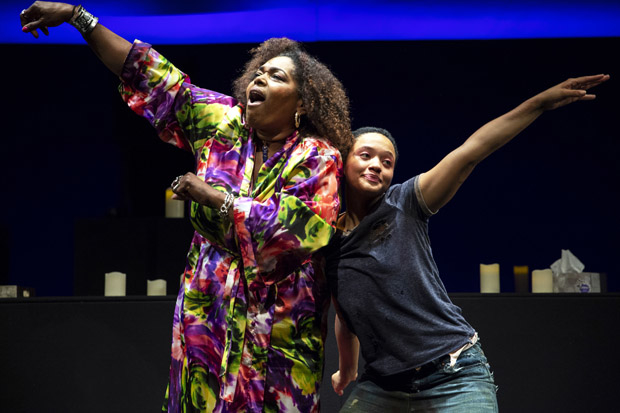Eve Ensler Pushes the Boundaries of the Female Body in Fruit Trilogy

(© Maria Baranova)
Few people write about what Eve Ensler writes about, and none write the way she does. Whether The Vagina Monologues, her landmark play about female genitalia, or the recent In the Body of the World, an open look at her battle with late-stage uterine cancer through the lens of her humanitarian efforts in the Congo, Ensler's work is all-important to the theatrical community and the world at large. Fruit Trilogy, receiving its American premiere at the Lucille Lortel Theater, is no different.
A series of three short one-acts, Fruit Trilogy, directed by Mark Rosenblatt for Abingdon Theatre Company, explores the ownership of the female body. In Pomegranate, two pieces of fruit (Kiersey Clemons and Liz Mikel) sit on the shelf of a supermarket waiting to be sold. In Avocado, a young prostitute (Clemons) relives her violent and occasionally tender experiences as she's trafficked in a shipping container holding rotting fruit. Finally, in Coconut, a woman (Mikel) reclaims her body in front of us as she ritualistically puts on coconut oil following a bath.
After watching Fruit Trilogy, it's not entirely surprising that Abingdon has placed "trigger warning" signs on the theater walls. The play contains the kind of frank language about deeply personal situations that is likely to disturb some audience members. However, Ensler's eyebrow-raising scenes are not gratuitous. Fruit Trilogy is an honest, unflinching look at the way women's bodies are commodified (bought and sold as though they're produce), violated, and — with great difficulty, courage, and strength — eventually accepted by their owners.
Rosenblatt's production, which originated at England's West Yorkshire Playhouse in 2016, creates an uncomfortable, dystopian world. The walls of Mark Wendland's claustrophobic set, seen only through the sharp shards of Jeanette Oi-Suk Yew's lighting, feel as though they're closing in on the performers. Matt Hubbs's anxious sound design makes us equally uneasy. Andrea Lauer's costumes are simultaneously of our world and yet completely foreign.
Mikel delivers a big, buoyant performance during Coconut, a lengthy monologue that runs the gamut, taking her through fires of hell and back (and ends with a topless dance party). Clemons's work during the Sartrean Avocado is brave and upsetting — extremely upsetting, in fact, though she seems to miss a certain amount of bleak humor in Ensler's script. (Ensler knows where and how to place a joke — even if it's just a single piquantly funny line — and there are several of them in Avocado that don't get hit with the right delivery.) Both Mikel and Clemons deliver the curt rhythms of the Beckettian Pomegranate with finesse and skill. That playlet, which opens the show and is no longer than 10 minutes, is perhaps the most disturbing of all.
Fruit Trilogy doesn't entirely coalesce overall, but it lays it all on the line, and its stars leave it all on the stage. It's a significant piece that shouldn't be ignored, especially now.

(© Maria Baranova)










